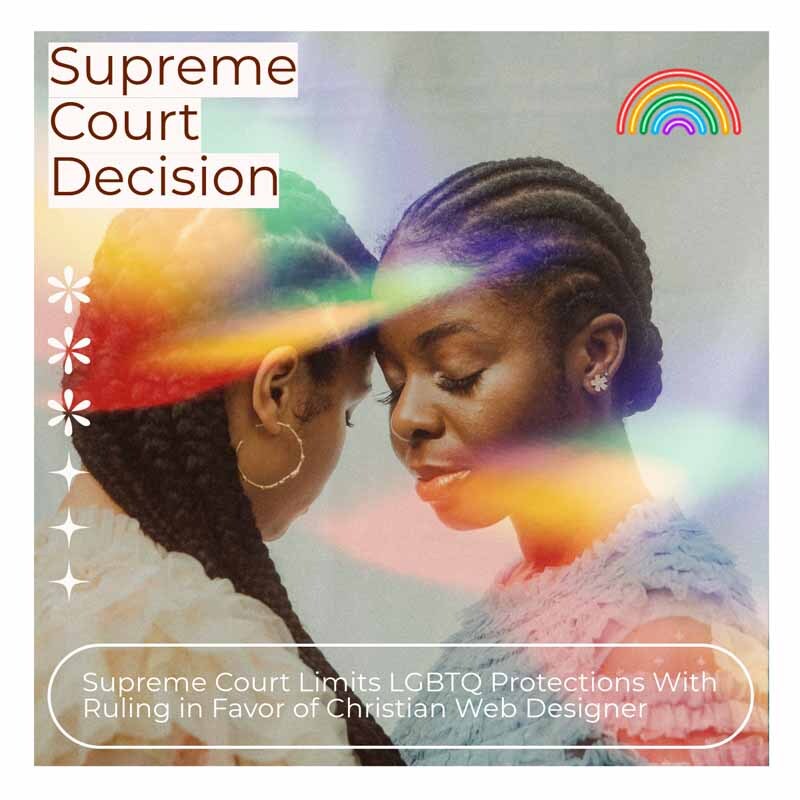 News Staff
News Staff![]() -
June 30, 2023 -
Business -
LGBTQ
same sex web design
-
3.1K views -
0 Comments -
0 Likes -
0 Reviews
-
June 30, 2023 -
Business -
LGBTQ
same sex web design
-
3.1K views -
0 Comments -
0 Likes -
0 Reviews

DLNews Staff:
We’re only six months into Justice Ketanji Brown Jackson’s first term on the Supreme Court, and already her jurisprudence is telling. Though her debut merits opinion addressed a technical, commercial dispute, four of the five orders she has written address critical civil rights issues.
In a significant win for religious conservatives, the Supreme Court on Friday ruled in favor of a Christian web designer in Colorado who refuses to create websites to celebrate same-sex weddings out of her religious objections. The 6-3 decision in 303 Creative LLC v. Elenis is a setback for the rights of gay people and could make it easier for businesses to discriminate against them, legal experts say.
The case involves Lorie Smith, who operates a website design business in Colorado and says her faith requires her to avoid creating sites for LGBTQ couples or companies celebrating their marriages. She claims state laws forbidding anti-discrimination in public accommodations, including refusing services to specific groups, violates her free speech and religious freedom. The ruling in favor of her was a sweeping victory for religious conservatives. It came amid concerns that the Supreme Court is ratcheting up restrictions on LGBTQ rights and undermining precedents like the 2015 case that established the right to same-sex marriage nationwide.

Earlier this year, the Supreme Court’s liberal justices voted 5-4 to reject arguments that the Constitution should give companies like Hobby Lobby and Green Forest Products the legal right to fire employees who don’t support the company’s political views. The decision was a blow to LGBTQ advocates, and it’s not clear whether the justices will take up any other similar challenges.
It’s also unclear how the decision in Smith’s case will affect federal laws ensuring equal protection against discrimination based on sexual orientation and gender identity. Most states have such laws, and the 6-3 ruling in Smith’s favor suggests the Supreme Court would likely uphold them.
Chief Justice John Roberts joined the majority in the 6-3 ruling, penned by President Donald Trump’s first Supreme Court appointee, Neil Gorsuch. He was joined by Justices Samuel Alito, Amy Coney Barrett, Brett Kavanaugh, and Clarence Thomas. Justice Sonia Sotomayor penned a scathing dissent, joined by her liberal colleagues Justices Elena Kagan and Ketanji Brown Jackson.
The 6-3 ruling in Smith’s favor is the first time the Supreme Court has granted a business the right to refuse service to members of a protected class on the grounds of religious objections. It also marks the court's first ruling against an equal protection argument under the Constitution's Establishment Clause.
The ruling also undermines the authority of the government to enforce laws against discrimination based on sexual orientation and gender identity, experts say. A group representing employers who say they’re compelled to fire or refuse to hire workers who don’t share their religious beliefs will almost certainly appeal the case.

Desert Local News is an invitation-only, members-based publication built on fact-checked, non-biased journalism.
All articles are publicly visible and free to read, but participation is reserved for members—comments and discussion require an invitation to join.
We cover local, state, and world news with clarity and context, free from political agendas, outrage, or misinformation.